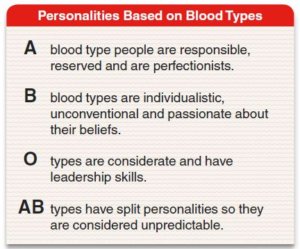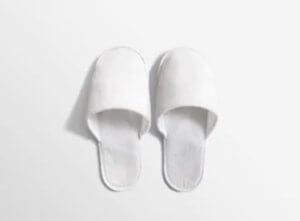What Surprises Non-Japanese While Living in Japan? (2): diagnose personality by blood type
There is a tendency to diagnose personality by blood type in Japan.
“Before coming to Japan, I had no idea what my blood type was,” says Christine, a 21-year-old Swiss woman studying at a Japanese university. “But time and time again, Japanese friends would look so disappointed when I said I didn’t know. Finally, I emailed my mom to get her to look up my medical records and find out. She thought I was crazy but I begged her. It was worth it because people seemed so delighted when I told them that I’m an ‘O type.’ The funny thing was that no one ventured to predict what it was before I said it. But once I told them, they all said, ‘I knew it’ ‘It’s so obvious.’ ”

A blood type people are responsible, reserved and are perfectionists.
B blood types are individualistic, unconventional and passionate about their beliefs.
O types are considerate and have leadership skills.
AB types have split personalities so they are considered unpredictable.
To predict people’s fortunes based on their blood types is a Japanese national past time and advice columns are featured in women’s magazines and on television variety programs. Unlike horoscopes with 12 different types of characteristics, because there are only four blood types, everyone remembers the personality traits of each blood type. A bigger surprise though is how many Japanese people assume these traits as facts. The notion of temperament based on ABO primary blood types was first introduced in Japan as scientific research. To justify racial supremacy, the fascist regimes of Germany and Japan developed a blood superiority theory. However, at the end of the Second World War, the concept was quickly dismissed because it had little scientific evidence.
In the 1970s, the theory was revived in Japan on a more casual level. But because of its quasi-scientific history, blood type determinism is widely accepted in Japan. “Mosquitoes don’t usually sting me because I’m AB type,” a friend once commented while others remarked how envious they were. Although some had never heard of the mosquito blood type preference theory, it was curious that no one questioned the logic of the statement.


